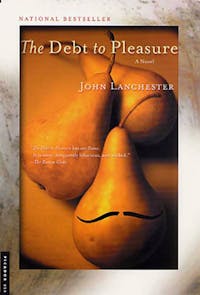The Debt to Pleasure
A Novel
 Download image
Download image
ISBN10: 0312420366
ISBN13: 9780312420369
Trade Paperback
272 Pages
$19.00
Winner of the Whitbread Award for Best First Novel
A New York Times Notable Book
The Debt to Pleasure is a wickedly funny, urbane ode to food. Traveling from Portsmouth to the south of France, Tarquin Winot, the book's impeccably correct and snobbish narrator, instructs us in his philosophy on everything from the erotics of dislike to the psychology of the menu. Under the guise of completing an altogether new sort of cookbook, Winot is in fact on a much more sinister mission that only gradually comes to light.
Reviews
Praise for The Debt to Pleasure
"The Debt to Pleasure has no flaws. It is witty, frequently hilarious, and wicked."—The Boston Globe
"Lanchester has written a novel masquerading as an essay masquerading as a cookbook, and it somehow manages to combine the virtues of all three."—The New Yorker
"Diabolically clever, Lanchester's debut novel more than lives up to its advance hoopla. This purported 'unconventional' cookbook-cum-memoir is a brilliant portrait of its narrator, a man whose professed gentility conceals a cold-blooded obsession and a sinister agenda. In a dry, supercilious manner, meant to display his soi-disant refined taste and superb erudition, Englishman and Francophile Tarquin Winot sets out to produce his physiologie du gout, a book that will include bona fide recipes (blini, fish stew), arcane culinary lore (the history of the peach), etymological disquisition (the origins of the words for coriander—from a variant of bedbug—and vodka) and fawning references to such culinary stars as Brillat-Savarin and Elizabeth David. Tarquin's commentary is larded with acidic bon mots, astringent asides and frequent invocations of figures ranging chronologically from Aeschylus to Auden, and culturally from James Bond to Luis Bunuel. But what lies between the lines gives the narrative its insidious fascination, for in his casual references to the accidental deaths of servants, a neighbor and various family members, Tarquin gives away his true character, suggested by his early statement that '[t]here is an erotics of dislike.' It is only gradually that the reader deciphers those clues and realizes that Tarquin is revealing far more than sibling rivalry when he insists that it is he—not his brother Bartholomew, a celebrated painter and sculptor—who has the true artist's genius. For those who appreciate linguistic virtuosity and light-fingered irony, who enjoy constructing a jigsaw puzzle out of tantalizing clues, this novel will be a lagniappe, fit for connoisseurs of fine food and writing."—Publishers Weekly
"In his elegant and cunning first novel, Lanchester, deputy editor of The London Review of Books, disguises a sinister tale of fraternal jealousy as an innocent cookbook. Many of his ingredients and methods are indelibly linked to memories of his childhood and early life. As the stories and characters appear and reappear, subtle and not-so-subtle shifts in narrator Tarquin Winot's remembrances point to something slighly more threatening than a literary gastronome's memoir. The evocative connection between food and the past, and the act of writing and the past, is notable more for what it conceals than what it unearths. Lanchester's writing is to be savored, and the observations of his buffoonishly high-brow narrator merit more than one reading. Very highly recommended."—Library Journal
"This unusual first novel takes the form of Englishman Tarquin Winot's memoirs, which are more like a string of essays on the oddities of life, each discourse prompted by remembrance of some meal or special dish, with recipes tossed in for good measure . . . those who appreciate fine language and like the feel of a mystery hanging over the story line will be quite at home."—Booklist
"What can be told without spoiling the tale—for there's a mystery here—is that the book is the story of a life, the life is that of an Englishman named Tarquin (originally Rodney) Winot, and Winot himself is the speaker of every carefully weighed sentence and exquisitely formed paragraph from start to end. A world-class chef and scholar extraordinaire (he calls himself an artist) of food and cuisine (not to mention manners, lore, and history in general), Winot hasn't lived a life that could be called underprivileged: With an ex-actress mother and an international-businessman father, both Winot and his older brother Bartholomew (who went on to become an internationally lionized artist and sculptor) were raised in a world of comfort and sophistication. Living both in London and Paris, the children had the benefit of cooks, nannies, and tutors—whose amusing quirks, oddities, and (above all) curious demises are narrated by Winot with customarily dry but unflaggingly amusing understatement and wit. As the book opens, the irrepressible Winot is driving through France, offering up opinions on the wines, foods, and art of Normandy and Brittany as he heads, ostensibly, for his house in Provence. He does reach the house, but things take on a deepened tone when he hooks up certain electronic spying devices, trails a young couple, and finally grants an interview—in which, to the reader, the increasingly mannered Winot at last reveals all—with a biographer-to-be of his illustrious brother. From a raconteur second to none, then, a whole-earth monologue that lectures on subjects from pancakes to poison peaches, gives opinions on matters from clothing to curry, and touches on life's crises from cradle to grave. For the intellectual reader, a feast, complete with hint of decay."—Kirkus Reviews


